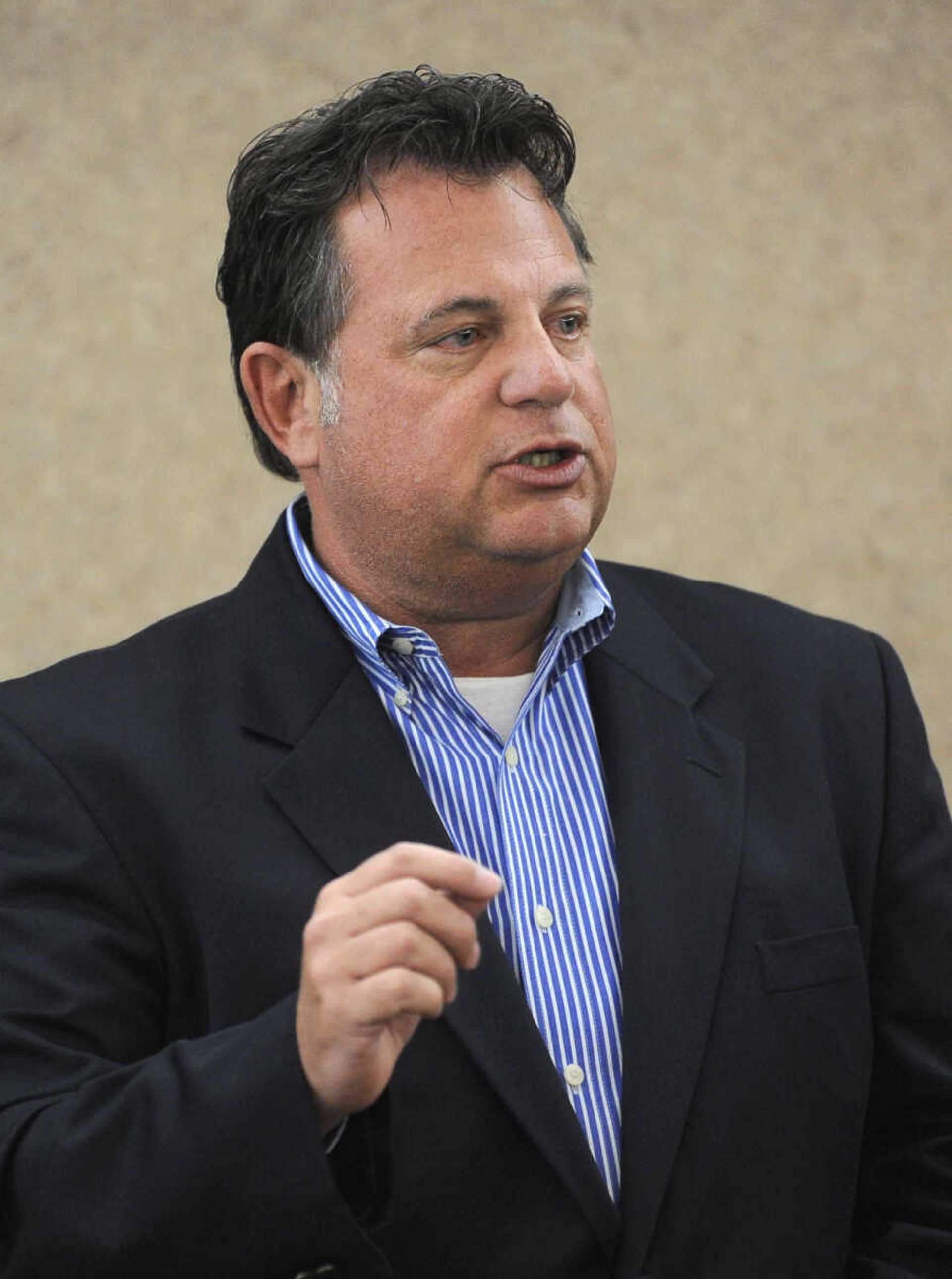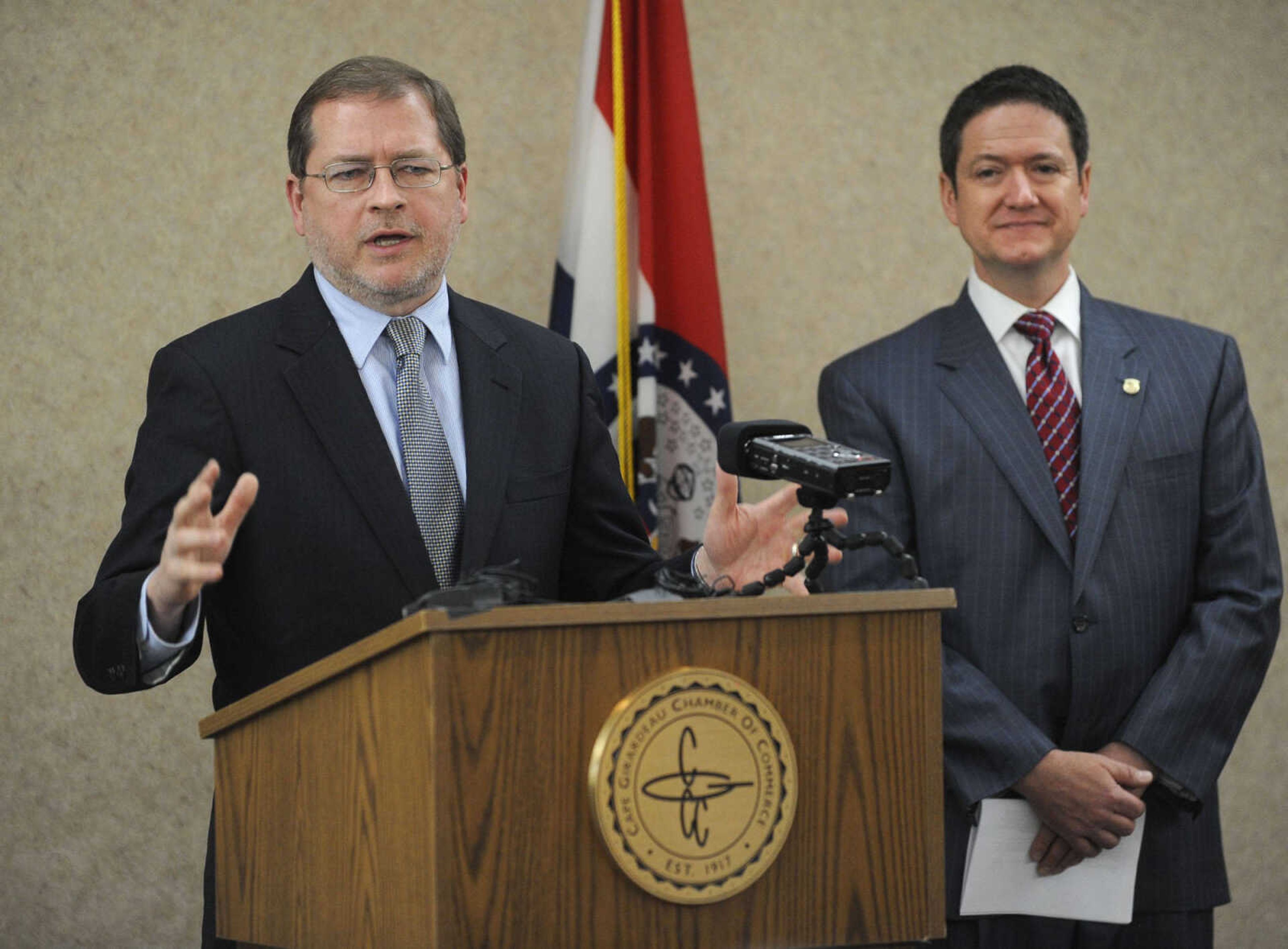House speaker chats up tax-cutting bill during news conference
The debate over a proposed tax-cutting bill came to Cape Girardeau Monday morning. Missouri Speaker of the House Tim Jones, accompanied by Americans for Tax Reform President Grover Norquist and United for Missouri executive director Carl Bearden, talked about Senate Bill 509 during a news conference at the Cape Girardeau Area Chamber of Commerce. ...
The debate over a proposed tax-cutting bill came to Cape Girardeau on Monday morning.
Missouri Speaker of the House Tim Jones, accompanied by Americans for Tax Reform president Grover Norquist and United for Missouri executive director Carl Bearden, talked about Senate Bill 509 during a news conference at the Cape Girardeau Area Chamber of Commerce. The conference immediately followed one from Gov. Jay Nixon, which focused on the governor's new proposal to help small businesses provide health insurance to employees.
The Senate bill, sponsored by State Sen. Will Kraus, R-Lee's Summit, would gradually cut individual state income tax rates from 6 percent to 5.5 percent and phase in a 25 percent deduction on business income earned by individuals. It also would require tax brackets to be adjusted annually for inflation.

Earlier this month, the bill was approved 23-9 in the Senate and 104-48 in the House. Local Republican senators and representatives stood in line with their party to approve the measure. Reps. Donna Lichtenegger, R-Jackson; Kathy Swan, R-Cape Girardeau; Holly Rehder, R-Sikeston; and Shelley Keeney, R-Marble Hill, also attended the news conference to show their support for the legislation.
It now waits on the governor's desk for approval. Many expect Nixon to veto the bill, which is similar to a piece of tax-cutting legislation he vetoed last year.
Jones said he has helped "lead the charge" on such measures because he believes it's important to reform an "antiquated, out-of-touch tax system" to make the state more competitive and spur economic growth.
"Our tax rate right now on our income tax is essentially a very high, flat tax of 6 percent," he said. "If you make over $9,000 in the state of Missouri, you're taxed at the highest state income tax rate. It has been that way since the 1930s. Reform is well overdue."
Norquist spoke to offer a more national view on the issue. He said there is "a very real competition" between the states. Neighboring Kansas won't even have income tax in the next six or seven years, he said, and political leaders in Arkansas, Nebraska and Oklahoma are considering "dramatically reducing" their income tax rates.
"People trying to decide whether to raise families here or someplace else, whether to continue to invest here or invest in other states, they're not just looking at what the tax rate is today," Norquist said. "They want to know the direction of taxes and spending. Does it get better, worse or is nothing moving and other states are moving forward?"
He said the bill sends a message to other states that Missouri is trying to bolster its small businesses, and the legislation should be a "model" for others considering reform.
After the bill was approved by the Senate, the governor announced his disappointment over the approval of a measure that "takes $620 million annually from public education and other priorities."
Under the governor's recommendation for fiscal year 2015, Cape Girardeau would receive $9,679,835, according to data from the Missouri School Boards' Association. With the full cost effect of Senate Bill 509, the district would receive $8,570,643, a $1,109,193 difference, the data said.
Jackson would receive $16,644,579 for fiscal year 2015 under the governor's recommendation. With the full cost impact of Senate Bill 509, it would be $15,344,622, a $1,299,957 difference, the information said.
But Jones said education would not be negatively affected by the legislation because of certain triggers and safeguards. No reduction would go into effect unless the net general revenue collected in the previous fiscal year increased by at least $150 million.
The speaker said he believes the bill would help "incentivize new growth and new revenue into our state; therefore we will have more money for our education system" and that the governor's claims about decreased education funding are "erroneous."
"That means to me that education is down on his priority list. I think he would want to work with us to fund education no matter what, like we have," Jones said. "The last eight years that I've been in the Legislature, we have not cut a single dollar out of our education budgets and in fact, we've added to education. Last year was the single largest increase that the legislation ever put into education, over $67 million."
Norquist also said Nixon's claims were little more than a scare tactic, one that he's seen politicians in every state use to prevent such measures.
"It's an old trick that doesn't work very well. If you thought something was important it would be the last thing you would cut, not the first thing," he said.
Bearden said the proof that education will not be negatively affected by the bill is in the numbers.
"Two years from now is when this tax cut goes into place. Two years from now, the state has to collect 150 million more net. That's more money," he said. "Two years from now the state education funding formula is going to be pretty much close to if not fully funded. There's going to be a couple hundred million dollars added this year. So $750 million has to be brought into the state over five years in order to cut 620 million dollars."
Should the governor veto the measure, Jones said he's confident the Republican caucus could gain the 109 votes necessary for an override.
srinehart@semissourian.com
388-3641
Pertinent address:
1267 N. Mount Auburn Road, Cape Girardeau, Mo.
Connect with the Southeast Missourian Newsroom:
For corrections to this story or other insights for the editor, click here. To submit a letter to the editor, click here. To learn about the Southeast Missourian’s AI Policy, click here.









